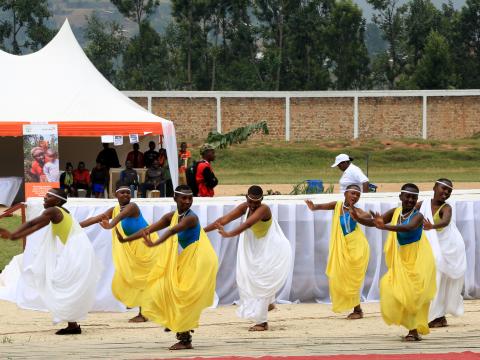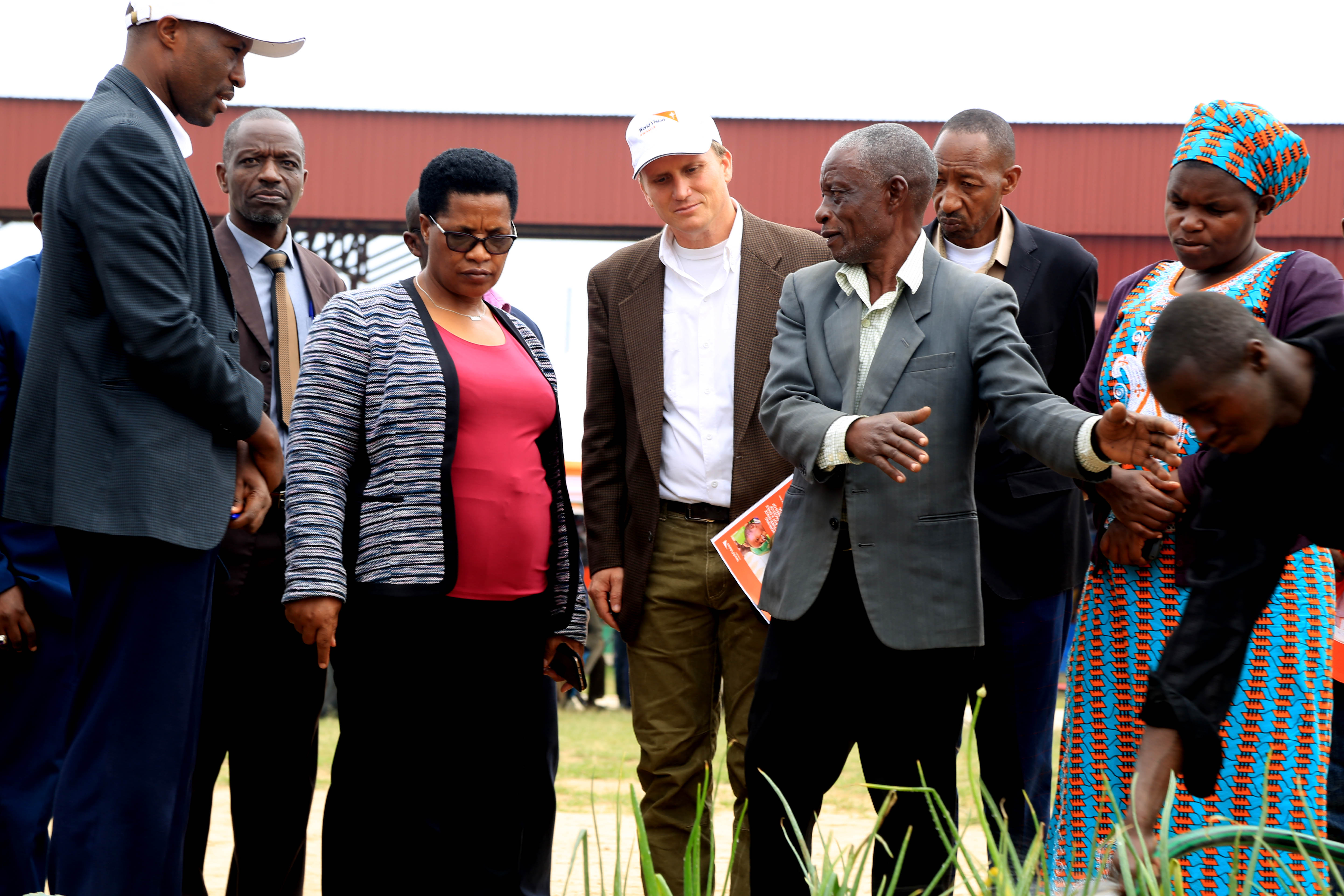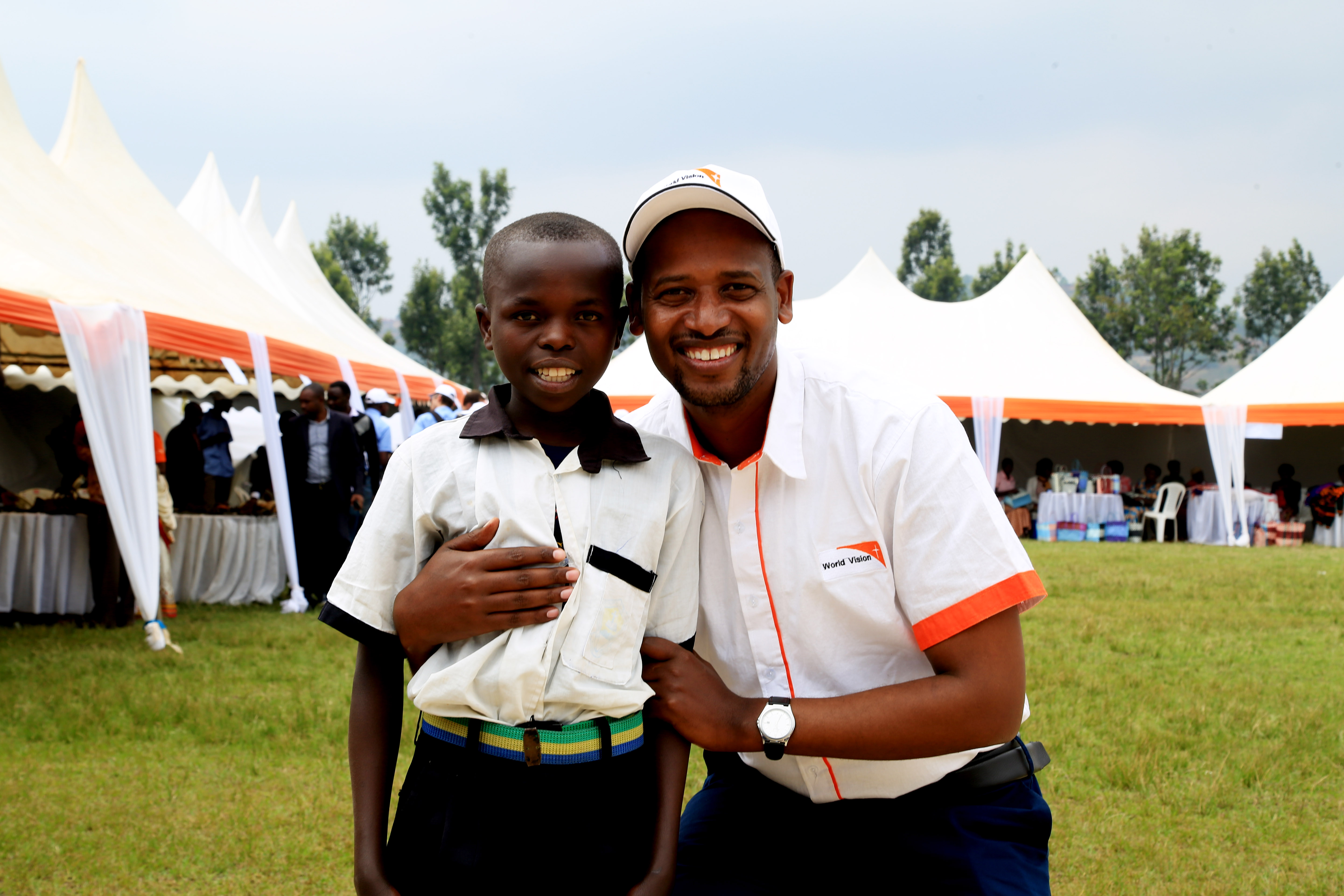World Vision celebrates reaching over 27,000 families in Nyamagabe

World Vision Rwanda's Nyamagabe and Mudasomwa Area Programmes began in 1999 as the organization transitioned from carrying out relief-oriented humanitarian work, to long-term sustainable development projects. In partnership with the Rwandan Government, other private sector partners and community members, World Vision Rwanda identified priority needs for people living within the six Administrative Sectors of Gasaka, Kamegeri, Tare, Kitabi, Uwinkingi, and Kibirizi, and discussed how to address them. After 19 years of working in these two area programmes, World Vision Rwanda's work has, among other achievements, improved the nutritional status of children in close collaboration with its partners; reducing stunting from 51% to 35.3% as at 2016.
World Vision Rwanda has also witnessed tremendous progress in raising the awareness of community members about child rights, abuse and protection, from only 53.3% of community members being able to identify and report a case of child abuse to 99% in 2016 (Mudasomwa Area Programme) and from 37% to 98.8% in 2016 (Nyamagabe Area Programme). Best of all, the proportion of households that can afford two meals per day has reached 91.6% in the areas covered by the two area programmes.
On Tuesday 29 August 2018, World Vision Rwanda joined its partners from the Government of Rwanda and the private sector, a visiting group of sponsors, and hundreds of community members at the Nyamagabe Stadium to celebrate the above and other achievements from the two area programmes. An event that began with a gallery walk showcasing some of the work of the beneficiaries whose lives have been positively impacted in one way or another through World Vision Rwanda's interventions, the closure ceremony also had guests treated to song, dance, and a play from well-known Rwandan entertainers; much to the delight of local community members.
Model farmer Israel Nsengiyumva (fourth from right) takes World Vision Rwanda National Director Sean Kerrigan (centre), and Southern Province Governor Rose Mureshyankwano (third from left) through what it takes to grow good vegetables. Israel was trained on good farming practices for crop and livestock by World Vision Rwanda. He now shares his learnings with others.
World Vision Rwanda's Integrated Programmes Director Ananias Sentozi, with a bright young man also named Ananias, who is part of a savings club at his school in Nyamagabe. Ananias and his fellow club members have all bought goats from their savings.
In his speech at the event, World Vision Rwanda's National Director Sean Kerrigan spoke of the scale of the impact made in people's lives, as well as of the significance of partnerships in ensuring that the needs of the most vulnerable are met with effective and sustainable solutions:
"Thanks to our donors, together with our partners, and by the favour of our Almighty God in heaven, we’ve touched the lives of more than 7,300 people every year throughout these years. With an average of five people per family, that’s over 27,000 families in total. This would not have been possible if you all would not have been with us on this wonderful journey of building brighter futures for vulnerable children.", he said.
"Having collaborated with local government and community structures all throughout the lives of Nyamagabe and Mudasomwa Area Programmes, we have learned that this collaboration has built and promoted a sense of ownership and improved supervision over any sites constructed, even when they are handed over to Districts. In the couple of years preceding the closure of these area programmes, we have been working closely with these groups, and are confident that it will only get better from here", he finished.
_________________________________
Below is a summary of World Vision Rwanda's achievements from over the last couple of decades of working in Nyamagabe and Mudasomwa Area Programmes:
Education & Life Skills
The Government of Rwanda considers education as a fundamental human right and an essential means to ensure that all Rwandans realize their full potential. At World Vision, we believe education to be the cornerstone of development, and so we work with parents, teachers, and other community members to find solutions that help children acquire the learning skills they need for life.
Throughout the lifetime of Nyamagabe Area Programme, we noted increased school attendance, whereby the average attendance rate reached 98% in primary education while school enrolment increased from 94.0% to 97.3% respectively in 2012 and 2015.
Health & Nutrition
Having access to adequate health services means more than just saving on travelling time and costs for community members: a 2016 World Vision Rwanda evaluation survey asked women where they had given birth. The evaluation findings revealed that 98.9% of women in Mudasomwa had delivered their babies at a health facility in comparison to 49.2% reported during a baseline survey in 2012.
Access to these vital health services means fewer infant deaths for children under five, and an opportunity to monitor, prevent, and appropriately handle any birth complications for mothers in these areas. Results of the same evaluation survey conducted by World Vision in 2016 indicated that there have been improvements in the nutritional status of children over years in Nyamagabe community; where the percentage of stunted children decreased from 51.0% (Baseline, Transformational Development Indicators, 2007) to 35.3% compared to national average of 38.0% (Rwanda Demographic Health and Survey, 2014-2015). The same findings indicate that the percentage of wasted children was also curbed from 4.2% to 2.8%. Cases of children being underweight also declined from 22.0% (Transformational Development Indicators, 2007) and 11% in the Rwanda Demographic Health Survey (2010), to 10.7% which is above the national average of 9%.
Resilience & Livelihoods
At World Vision, we’re happy to witness the most vulnerable families graduate out of extreme poverty, and are keen on equipping vulnerable families to be self-reliant once we have left. We promote a savings culture, and provide training and marketing expertise to help families to kick-start small businesses or access employment.
Families are also taught about health, nutrition, and hygiene practices to ensure that economic gains are translated into better care for their children. With regard to the proportion of households where one or more adults are earning an income, the baseline for the households with regular income was not captured, but the evaluation survey indicated that 40.5% of households had one or more adults earning income on a regular basis. The proportion of households that can afford 2 meals per day had reached 91.6% in 2016 (Lot Quality Assurance Sampling, March 2014).
Water, Sanitation & Hygiene
Water is not only a basic human right, it is also the essential building block of life that allows children and their communities to survive and flourish. When water is clean and safe, it helps children to be healthy and well nourished. Clean water helps facilitate proper sanitation and improved hygiene, reducing the spread of diseases that are responsible for 12% of deaths of children under five years old in Rwanda every year. Availability of clean water also means children are freed from the burden of walking miles to collect it, giving them time to go to school and realize their full potential.
World Vision partnered with Nyamagabe District to increase of proportion of households with access to clean water and it‘s now estimated at over 75%, and utilization of improved private pit latrines which had risen to 90% at the time of our 2012 Baseline Survey Report.
Sponsorship, Advocacy & Child Protection
In Mudasomwa Area Programme, World Vision Rwanda noted tremendous progress in raising the awareness of community members about child rights, abuse and protection. Our 2012 baseline findings showed that only 53.3% of community members were able to identify and report a case of child abuse. Our 2016 evaluation survey recorded 99.0% of community members who are now able to do so.
In Nyamagabe Area Programme, while baseline findings indicated only 37.0% of community members felt confident to report child abuses cases in 2012, our 2016 evaluation survey revealed that 98.8% of community members are now able to report and act on child abuse issues.
At the time of our 2016 evaluation report, 89% of Nyamagabe Area Programme’s 4,712 Registered Children were sponsored (that is about 4,208 children). This is key in ensuring that these children are able to go through and complete their studies, as well as have their other key needs met.

